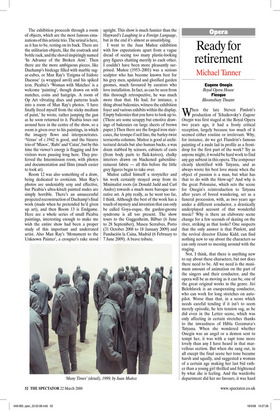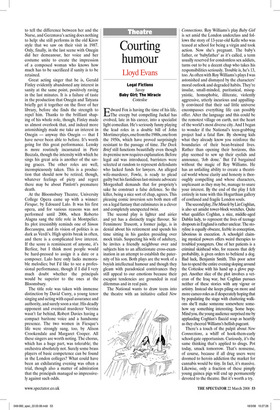Ready for retirement
Michael Tanner
Eugene Onegin Royal Opera House Fiesque Bloomsbury Theatre
When the late Steven Pimlott’s production of Tchaikovsky’s Eugene Onegin was first staged at the Royal Opera two years ago, it had a frosty critical reception, largely because too much of it seemed either routine or irrelevant. Why, for instance, do we get Flandrin’s famous painting of a nude lad in profile as a frontdrop for the first part of the work? Try as anyone might, it would be hard work to find any gay subtext in this opera. The composer clearly identified with Tatyana, and as always wrote his best love music when the object of passion is a man, but what has that to do with the blow-up? And why is the great Polonaise, which sets the scene for Onegin’s reintroduction to Tatyana after years of bored wandering, set as a funeral procession, with, as two years ago under a different conductor, a drastically underplayed account of that wonderful music? Why is there an elaborate scene change for a few seconds of skating on the river, striking as that looks? One suspects that the only answer is that Pimlott, and the revival director Elaine Kidd, can find nothing new to say about the characters so can only resort to messing around with the staging.
Not, I think, that there is anything new to say about these characters, but nor does there need to be. All we need is the maximum amount of animation on the part of the singers and their conductor, and the opera will be as moving as it can be, one of the great original works in the genre. Jiri Belohlavek is an exasperating conductor, who can work for long stretches on autopilot. Worse than that, in a score which needs careful tending if it isn’t to seem merely episodic, he lets tension sag, as he did even in the Letter scene, which was only affecting in certain stretches thanks to the inwardness of Hibla Gerzmava’s Tatyana. When she wondered whether Onegin was an angel or a demon sent to tempt her, it was with a rapt tone more lovely than any I have heard in that marvellous section. But when she sang out, in all except the final scene her tone became harsh and squally, and suggested a woman of a certain age making her last bid rather than a young girl thrilled and frightened by what she is feeling. And the wardrobe department did her no favours, it was hard to tell the difference between her and the Nurse, and Gerzmava’s acting does nothing to help: she still performs in the old Kirov style that we saw on their visit in 1987. Only, finally, in the last scene with Onegin did her demeanour, her voice and her costume unite to create the impression of a composed woman who knows how much has to be sacrificed if sanity is to be retained.
Great acting singer that he is, Gerald Finley evidently abandoned any interest in sanity at the same point, positively raving in the last minutes. It is a failure of taste in the production that Onegin and Tatyana briefly get it together on the floor of her library, before she finds the strength to repel him. Thanks to the brilliant shaping of his whole role, though, Finley made us almost overlook that, and indeed more astonishingly made me take an interest in Onegin — anyway this Onegin — that I have never been able to before. It’s worth going for this great performance. Lensky is more routinely incarnated in Piotr Beczala, though the intensity with which he sings his great aria is another of the saving graces. The other roles are well, inconspicuously taken. This is a production that should now be retired, though, whatever feelings of piety and regret there may be about Pimlott’s premature death.
At the Bloomsbury Theatre, University College Opera came up with a winner: Fiesque, by Edouard Lalo. It was his first opera, and for various reasons was not performed until 2006, when Roberto Alagna sang the title role in Montpelier. Its plot irresistibly reminds one of Simon Boccanegra, and its vision of politics is as dark as Verdi’s. High spirits break in often, and there is a complicated love interest. If the score is reminiscent of anyone, it’s Berlioz, but I think most people would be hard-pressed to assign it a date or a composer. Lalo here only lacks memorable melodies; but I’d like to see a professional performance, though if I did I very much doubt whether the principals would be superior to the ones at the Bloomsbury.
The title role was taken with immense distinction by David Curry, a young tenor singing and acting with equal assurance and authority, and surely soon a star. His deadly opponent and eventual murderer Verrina wasn’t far behind, Robert Davies having a compact baritone voice and a handsome presence. The two women in Fiesque’s life were strongly sung, too, by Alison Crookendale and Margaret Cooper. All these singers are worth noting. The chorus, which has a huge part, was tolerable; the orchestra absolutely not. Surely some brass players of basic competence can be found in the London colleges? What could have been an exhilarating evening was often a trial, though also a matter of admiration that the principals managed so impressively against such odds.



















































































 Previous page
Previous page